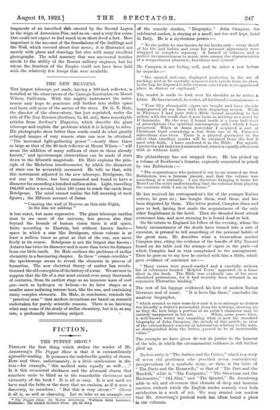FICTION.
THE PUPPET SHOW.*
PERHAPS the first thing which strikes the reader of Mr. Armstrong's The Puppet Show is that it is extraordinarily agreeable reading. It possesses the indefinable quality of charm. Here and there, unfortunately, is a little carelessness in dic- tion—for example, " this method suits equally as well . . ." Is it this occasional slackness and the aforesaid charm that somehow unite to blind us to the remarkable cleverness and virtuosity of the book ? It is all so easy. It is not until we have read the fable or the story that we exclaim, as if it were a discovery, to ourselves : " But this is very clever ! " Clever it all is, as well as charming. Let us take as an example one • The Puppet Show. By Martin Armstrong. Waltham Saint Lawrence, Berkshire : The Golden Cockerel Press. Lee. ed. net.]
of the comedy studies, " Biography." John Campion, the celebrated author, is staying at a small, not too well kept, hotel in Italy. He is a mysterious person :- " To the public he was known by his books only : every detail of his life and habits and even his personal appearance were wrapped in complete mystery. A hatred of tobacco and a perfect irresponsiveness to music were among the characteristics of a temperament pharisaic, fastidious and cynical."
Mr. Campion is not feeling well, and he takes a rest before he unpacks :-
" His opened suit-case displayed perfection in the art of packing, and as he carefully removed each article from its place in the bag, he disposed it with extreme exactitude in its appointed place in drawer or cupboard."
The reader is made to look over his shoulder as he writes a letter. He has executed, he writes, all his friend's commissions:- " Your fifty abominable cigars are bought and have already impregnated all my linen with their disgusting stench. While in Florence I had your wife's Bible bound according to her orders, with the result that it now looks as inviting as a novel by D'Annunzio. By the way, I found inside it a loose half -sheet of prescriptions (for spiritual consumption only) which I have preserved. When at Assisi yesterday I acquired a sort of Christmas Card containing a leaf from one of St. Francis's miraculous rose-trees. There is a printed guarantee to the effect that excellent results will be obtained from the leaf if used with faith. I have enclosed it in the Bible. For myself, I prefer the old-fashioned mustard-leaf, which is equally efficacious with or without faith."
His philanthropy has not stopped there. He has picked up a volume of Beethoven's Sonatas, copiously annotated in pencil by one Rubinstein :— " The acquaintance who pointed it out to me assured me that Rubinstein was -a famous pianist, and that the volume was something of a curiosity. I am therefore bringing it home for Muriel on the strict understanding that she refrains from playing the contents while I am in the house."
He has received his correspondent's list of the younger Italian writers, he goes on ; has bought them, read them, and has been disgusted by them. This letter posted, Campion dines and goes to bed, having first made the acquaintance of the only other Englishman in the hotel. Then the dreaded heart attack overcomes him, and next morning he is found dead in bed.
On his return to England his fellow of the evening, whom the lonely circumstances of the death have turned into a sort of executor, is pressed to tell something of the personal habits of the great man. He describes what a tremendous smoker Campion was, citing the evidence of the bundle of fifty Toscani found on his table and the stumps of cigars in the grate—of which Campion had in vain complained to the management. Then he goes on to say how he carried with him a Bible, which gave evidence of continual use :— " Many verses were pencil-marked and a carefully written list of references headed ' Helpful Texts' appeared on a loose sheet in the book. The Bible was evidently one of his most cherished possessions, for it had recently been rebound in an expensive Florentine binding."
The rest of his luggage evidenced his'Iove of modern Italian literature and of music. " It is facts Iike these," concludes the amateur biographer,
" which remind us once more how rash it is to attempt to deduce too literally a writer's personality from his writings, showing us, as they do, how large a portion of an artist's character may bo entirely unapparent in his art. . . . When, some years later, a well-known writer was compiling what is now the standard biography of John Campion, the details of this article, in view of the extraordinary scarcity of information relating to the man, as distinguished from the writer, proved to be of inestimable value."
The excerpts we have given do not do justice to the humour of the tale, in which the circumstantial evidence is still further
Piled up.
No less witty is "The Author and the Critics," which is a story of seven old gentlemen who provided seven contradictory interpretations of a symbolic story, or there is the fable of " The Poets and the Housewife," or that of " The Poet and the Mandrill," while in " The Emigrants," " The Showman and the Marionettes," " Old Alan," and " The Quarrel," Mr. Armstrong adds to wit and cleverness that element of deep and humane emotion without which the English reader scarcely ever feels satisfaction in a work of art. We may remind our readers that Mr. Armstrong's poetical work has often found a place in our columns.


































 Previous page
Previous page